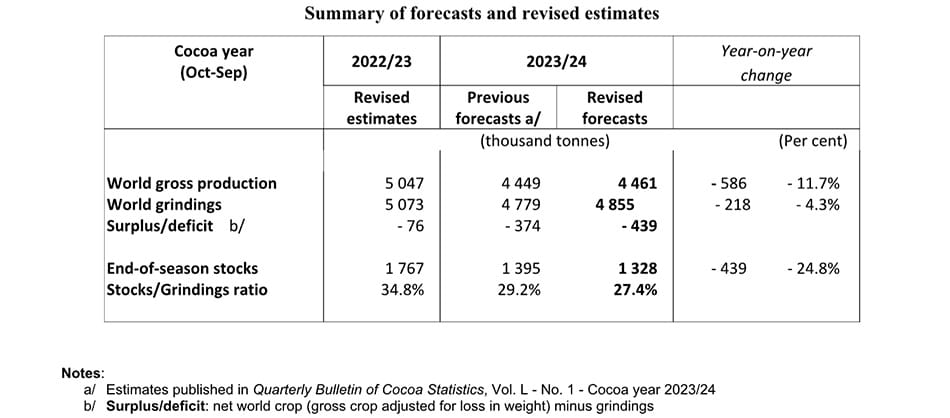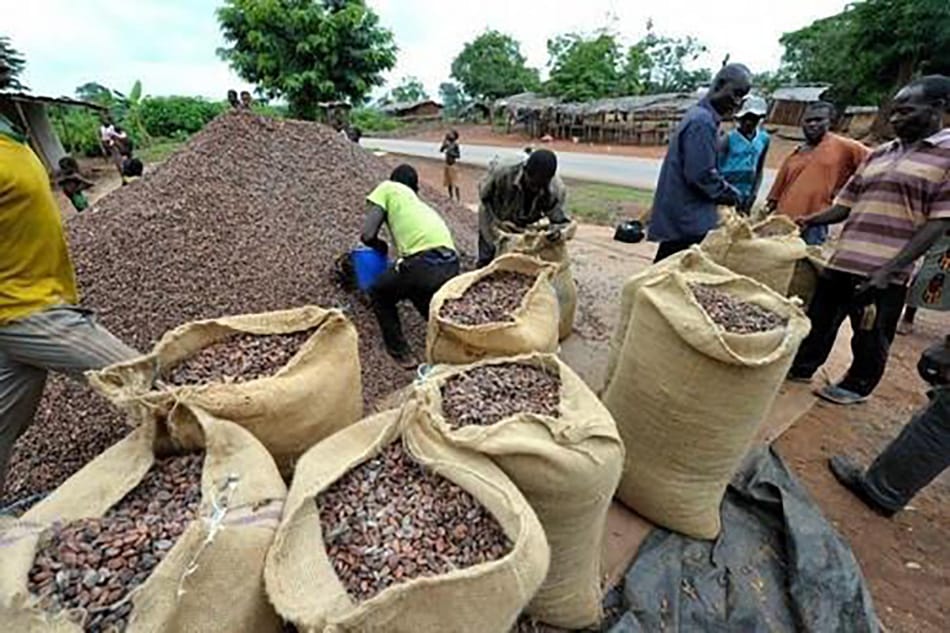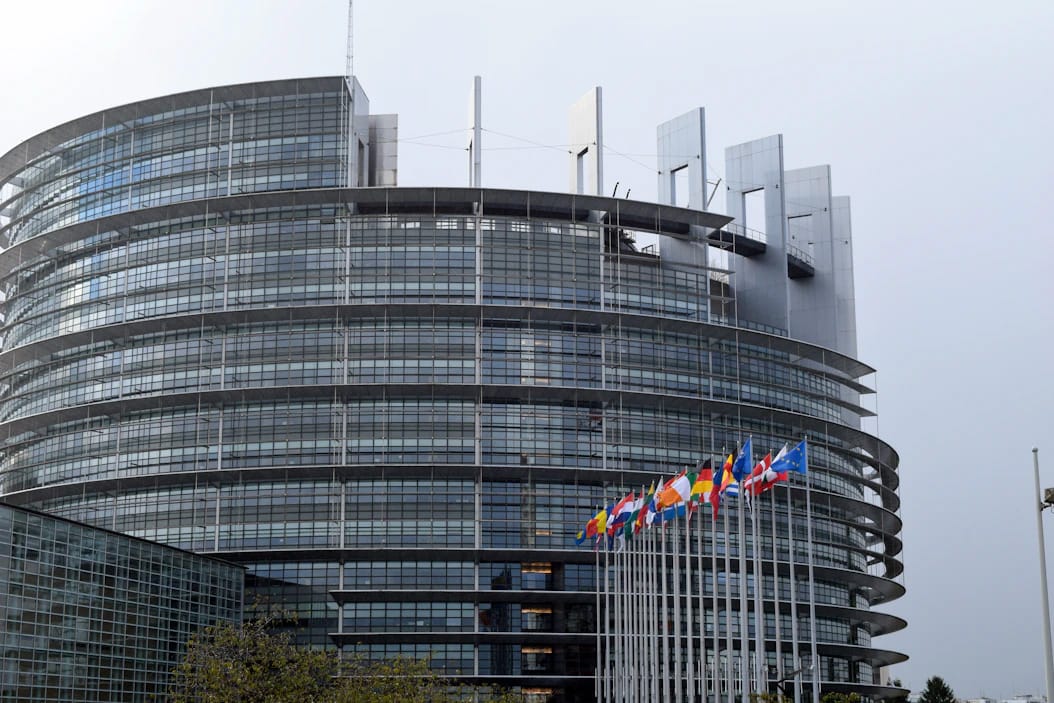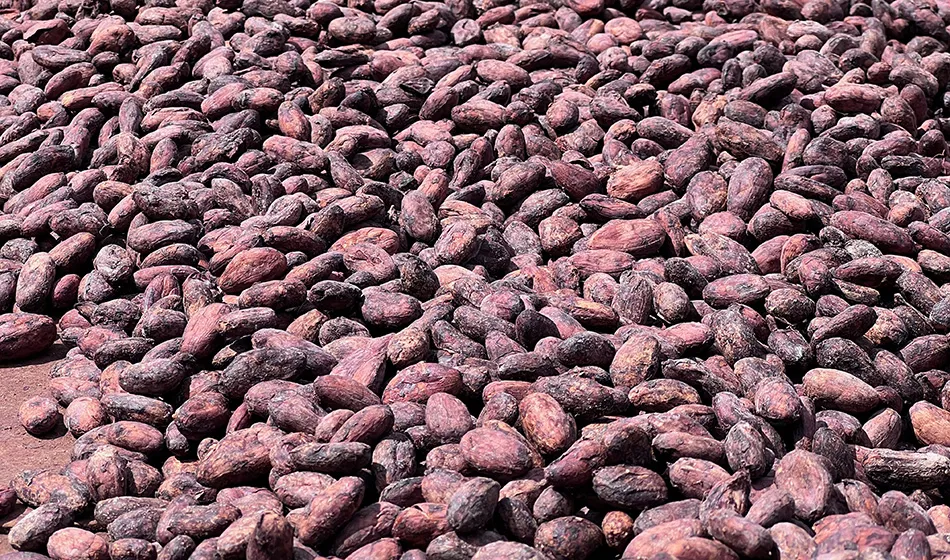The International Cocoa Organization (ICCO) has released its revised forecasts for the 2023-24 cocoa year. As the 2023-24 season progresses, it will undoubtedly end with a higher deficit than previously expected.
Independent sources reveal that pod counts in key producing regions have deteriorated. The 2024-25 season is now forecast to post a deficit of 160,000 to 200,000 tonnes. This deficit comes from an already depleted inventory base following the 500,000-tonne deficit in the 2023-24 season, making the situation more acute.
Traders are already reporting issues with the supply and quality of beans not helped by October rains in West Africa. For the season under review, unfavourable weather conditions, black pod diseases, and Cocoa Swollen Shoot Virus Disease (CSSVD) were detrimental to the output of the major producing countries in West Africa.
The El Niño warming weather phenomenon was the primary cause of last season’s poor harvest, and farmers hoped that a transition to the cooling La Niña pattern would revive yields.
Cocoa prices have increased by +3% in the past three weeks. The latest bulletin from the ICCO includes revised forecasts for the 2023-24 cocoa year and estimates of world production, grindings, and stocks of cocoa beans for the 2022/23 cocoa year. This suggests that prices will likely rise further in the market in the run-up to Christmas.

Global production and grindings are projected to decline by 11.7% to 4.461 million tonnes and 4.3% to 4.855 million tonnes, respectively.
At the start of this season, increasing cocoa prices caused uncertainty regarding cocoa demand. The ICCO’s currently available data reveal that cocoa grinding activities have been unrelenting in importing countries despite the record price rallies.

Still, grinding at origin, previously viewed as an impetus to prop up demand as producing countries engaged earnestly in value-added investments, has slowed due to the lack of beans.
As analyst Pierre Andurand writes in the FT, the outlook for cocoa beans offers unwelcome tidings for chocolate makers, who hope prices are on the retreat.
“With the current rally barely a year old and supply headwinds likely to worsen for at least four years, the stage appears set for cocoa prices to reach new inflation-adjusted highs.”

EUDR UPDATE: ‘Modest’ amendment on delay means legislation likely to be passed by the end of 2024
The political stalemate in Brussels regarding the implementation of the European Union Deforestation Regulation has ended with the European Council and Parliament agreeing, after further ‘trilogues,’ on its targeted amendment to postpone its date of application by 12 months to 30 December 2025.
This provisional agreement still needs to be confirmed by both institutions before going through the formal adoption procedure. Further amendments tabled by the right of centre European People’s Party (EPP) were withdrawn in exchange for a commitment from the EU Commission to update the EUDR in 2028 when countries practicing sustainable forest management and showing no deforestation will have the opportunity to be exempted from unnecessary red tape.

The EU’s deforestation regulation was adopted in 2023 to ensure that products derived from certain commodities placed on the EU market or exported from the EU have not caused deforestation or forest degradation during their production and have been produced in accordance with the relevant legislation of the country of production, and are covered by a due diligence statement.
The Commission submitted its proposal on postponing the application date of the deforestation regulation in response to concerns raised by member states, third countries, traders, and operators that they might need more time to fully comply with the rules by 31 December 2024, when the law would effectively come into force.
On 16 October 2024, the European Council agreed on its position on amending the EUDR, postponing its date of application by 12 months. On 20 November 2024, the Council reiterated its support for the proposed targeted amendment, rejecting another of the EPP amendments that called for establishing a 'no-risk' category in the benchmarking process. This means companies would only need to show evidence of compliance if requested by the competent authority.
Political games
In a statement on LinkedIn after the announcement late Wednesday night (3 December 2024), Delara Burkhardt, MEP, Group of the Progressive Alliance of Socialists and Democrats, said: “The behaviour of the EPP Group was irresponsible. With their political games, they created uncertainty for businesses and damaged the reputation of the European Parliament as a serious negotiating partner.
“Instead of seeking a broad majority in the centre, the EPP Group preferred the flirt with the far right, even though it was clear all along that their half-baked amendment proposals had no chance of success with the Council and the Commission.
“From the start, we, Social Democrats, proposed a solution that is now reflected in the final outcomes, namely to modestly postpone the Deforestation Regulation by one year and to demand a commitment from the European Commission on further support measures for businesses. This will give companies sufficient additional time and assistance to prepare for the implementation of the regulation.”
EPP Group claims victory
Still, the EPP Group has claimed a victory by pushing for more than just a postponement. A statement said: "The European Commission has committed itself to updating the Deforestation Law within a year. This is thanks to the EPP Group,
"We ensured that the new law does what it is meant to: diminish illegal deforestation. We must not penalise those who are already managing forests sustainably. We need to help them continue doing so.”
Next steps for the troubled EUDR
The European Parliament's Environment Committee vote is expected next Wednesday. The agreement will be confirmed in the plenary session in December before the current regulation's application date (30 December 2024).



